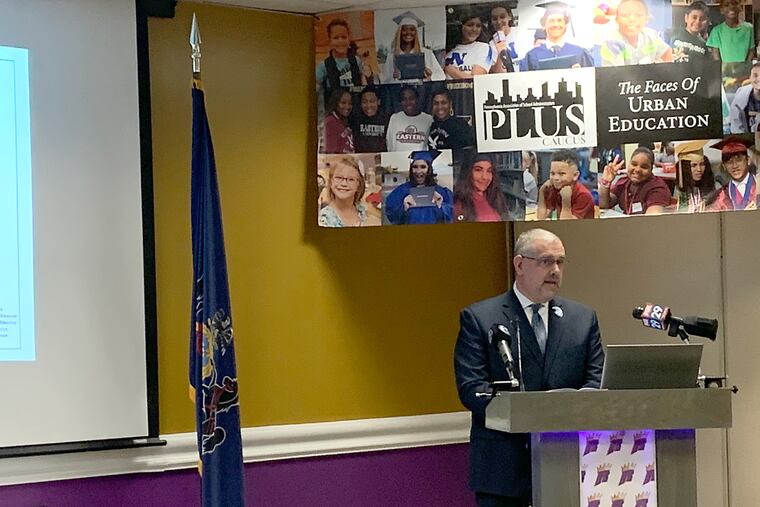Urban superintendents across Pa. push for more school funding before pandemic money runs out
While federal pandemic relief money has provided a significant boost, it ends in the 2024-25 school year.

With teacher shortages threatening staffing levels, gun violence inflicting trauma on students, and aging facilities requiring mounting repairs, superintendents in urban districts across Pennsylvania called on state officials Tuesday to ramp up funding for the neediest schools.
At a news conference at Upper Darby High School, superintendents from Upper Darby, Philadelphia, Chester Upland, Southeast Delco, and Norristown said their districts have urgent needs that require more state aid.
While federal pandemic relief money has provided a significant boost — in Upper Darby, for instance, paying for technology, employee retention efforts, mental health supports, and summer programs — it ends in the 2024-25 school year.
“The problem is: what happens when this money goes away?” said the district’s superintendent, Dan McGarry, who said his district was facing a staffing “crisis” and needed more money to prevent its teachers from leaving for better-paying districts.
Advocates for increased school funding won a historic victory earlier this year with a Commonwealth Court judge’s decision finding Pennsylvania’s current funding system unconstitutional, for both failing to give schools the resources they need, and for creating inequities that have deprived students in lower-wealth districts.
However, it’s still unclear how the governor and lawmakers will address the problem. In his first budget proposal, Democratic Gov. Josh Shapiro called for an added $567 million in basic education funding, the main form of state aid to Pennsylvania’s 500 school districts. That’s a 7.8% increase over last year, largely tracking with inflation.
Needier districts get a larger share of that money under Pennsylvania’s funding formula, which awards aid based on a district’s share of students in poverty and other factors increasing educational costs. But the formula only applies to a portion of state education spending.
And most funding for schools in Pennsylvania comes from local property taxes, contributing to gaps in spending between wealthier and poorer districts, which can’t raise the same revenue as more affluent counterparts even at higher tax rates.
Christopher Dormer, the superintendent of the Norristown Area School District, said Tuesday he would “take [Shapiro] at his word” that the governor’s budget proposal — which included a total $1 billion increase in education funding — represented only a “down payment” toward fixing the system.
But, he said, schools need more funding “as soon as possible to meet the growing needs of our students.” He and other superintendents called for changes to how charter schools are funded — a perennial complaint for school districts, particularly regarding cyber charters, which are funded by districts at the same rate as brick-and-mortar charters. Charter leaders have said funding cuts would hurt their students.
A number of school leaders said safety was a growing concern requiring investment. In Philadelphia, Superintendent Tony B. Watlington Sr. said the district wants to expand a program that pays people to help ensure students can walk safely to school, and another that pays police officers to staff “school safety zones.” The district has lost 18 students this school year to gun violence, while more than 80 have been affected by shootings, he said.
“We must win this war on gun violence, and we must do a better job funding our schools,” Watlington said.
Brenda Wynder, superintendent of the Southeast Delco School District, said the district has provided added emotional support resources to help students facing trauma, including three social workers, and six coordinators who work with students on peer mediation.
But “that’s just not enough,” she said, noting recommendations that schools have one counselor for every 250 students. Southeast Delco has one for every 600 to 700.
“It is evident that we need more funding. It is evident that we need that funding to be permanent,” she said.
The participating districts Tuesday were part of the Pennsylvania League for Urban Schools, a group of 29 urban districts that have been advocating for more funding. Other news conferences were held in the Lancaster, Johnstown, Bethlehem Area, and East Allegheny school districts.